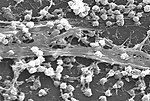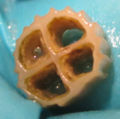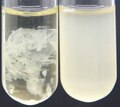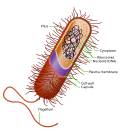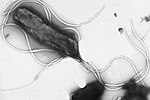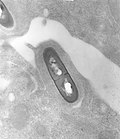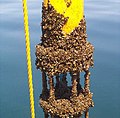polymeric substances (EPSs) adhere to each other and/or to a surface. A biofilm is a system that can be adapted internally to environmental conditions...
121 KB (14,128 words) - 16:42, 9 October 2024
Biofilm formation occurs when free floating microorganisms attach themselves to a surface. Although there are some beneficial uses of biofilms, they are...
17 KB (2,189 words) - 09:51, 4 October 2024
An intertidal bioflim is a biofilm that forms on the intertidal region of bodies of water. Bacteria and various microorganisms, including algae and fungi...
37 KB (3,886 words) - 13:03, 10 May 2024
Pseudomonas aeruginosa (redirect from Genes Involved in Pseudomonas aeruginosa Biofilm-Specific Resistance to Antibiotics)
is capable of extensive colonization, and can aggregate into enduring biofilms. The word Pseudomonas means "false unit", from the Greek pseudēs (Greek:...
92 KB (10,021 words) - 13:38, 2 November 2024
SCOBY (section Biofilm characteristics)
SCOBY. In its most common form, SCOBY is a gelatinous, cellulose-based biofilm or microbial mat found floating at the container's air-liquid interface...
14 KB (1,654 words) - 19:19, 8 October 2024
Moving bed biofilm reactor (MBBR) is a type of wastewater treatment process that was first invented by Professor Hallvard Ødegaard at Norwegian University...
20 KB (2,272 words) - 14:37, 25 April 2024
Dental plaque (section Dental plaque as a biofilm)
Dental plaque is a biofilm of microorganisms (mostly bacteria, but also fungi) that grows on surfaces within the mouth. It is a sticky colorless deposit...
38 KB (4,551 words) - 03:47, 9 October 2024
biofilm production (Tavares-Carreon et al., 2023). Biofilm production increases antibiotic resistance because bacteria at the bottom of the biofilm are...
30 KB (3,314 words) - 13:18, 11 September 2024
Staphylococcus aureus (section Biofilm)
aureus embedded in biofilms. A class of enzymes have been found to have biofilm matrix-degrading ability, thus may be used as biofilm dispersal agents in...
114 KB (12,720 words) - 11:18, 29 October 2024
aggregations in thick layers called biofilms. There has been a great effort to develop efficient methods for biofilm removal or prevention in clinical and...
21 KB (2,649 words) - 17:11, 30 September 2023
aggregate that may be contrasted with biofilms and granules, or else considered a specialized type of biofilm. Flocs appear as cloudy suspensions of...
4 KB (392 words) - 18:53, 30 May 2024
Extracellular polymeric substance (section Biofilm)
of biofilms, and are considered the fundamental component that determines the physicochemical properties of a biofilm. EPS in the matrix of biofilms provides...
62 KB (7,256 words) - 16:41, 9 October 2024
Staphylococcus epidermidis (section Biofilm formation)
with catheters or other surgical implants because it is known to form biofilms that grow on these devices. Being part of the normal skin microbiota, S...
28 KB (2,880 words) - 10:58, 11 August 2024
Staphylococcus haemolyticus (section Biofilm formation)
devices. The highly antibiotic-resistant phenotype and ability to form biofilms make S. haemolyticus a difficult pathogen to treat. Its most closely related...
26 KB (2,402 words) - 19:27, 28 November 2023
Phototrophic biofilms are microbial communities generally comprising both phototrophic microorganisms, which use light as their energy source, and chemoheterotrophs...
13 KB (1,601 words) - 01:12, 8 March 2023
Phage therapy (section Treatment of biofilm infections)
there is a biofilm covered by a polysaccharide layer, which antibiotics typically cannot penetrate. Phage therapy can disperse the biofilm generated by...
106 KB (11,409 words) - 00:42, 21 October 2024
prokaryotes, such as cyanobacteria, may form colonies held together by biofilms, and large colonies can create multilayered microbial mats. Others, such...
44 KB (4,782 words) - 21:35, 2 October 2024
secrete Dispersin B to release adherent cells from a mature biofilm colony by disrupting biofilm formation. The enzyme catalyzes the hydrolysis of linear...
14 KB (1,639 words) - 21:02, 15 March 2024
Trickling filter (section Biofilm)
other wastewater flows downward and causes a layer of microbial slime (biofilm) to grow, covering the bed of media. Aerobic conditions are maintained...
12 KB (1,458 words) - 20:23, 24 January 2024
particular schmutzdecke varies, but will typically consist of a gelatinous biofilm matrix of bacteria, fungi, protozoa, rotifera and a range of aquatic insect...
1 KB (130 words) - 15:35, 14 June 2024
Helicobacter pylori (section Biofilm)
orange stain, and phase-contrast microscopy. It is capable of forming biofilms. Biofilms help to hinder the action of antibiotics and can contribute to treatment...
148 KB (16,618 words) - 02:06, 3 November 2024
The Center for Biofilm Engineering (CBE) is an interdisciplinary research, education, and technology transfer institution located on the central campus...
48 KB (4,568 words) - 08:08, 30 August 2024
the formation of biofilms. This increases the likelihood of food contamination and is further complicated by the fact that biofilms are highly resistant...
59 KB (6,188 words) - 11:29, 25 October 2024
treating illness caused by biofilms, and prevent the formation of such biofilms and possibly weaken established biofilms. Disrupting the signaling process...
81 KB (9,944 words) - 05:22, 28 October 2024
initiating the formation of a biofilm. By the end of the first week, the rich nutrients and ease of attachment into the biofilm allow secondary colonizers...
38 KB (4,410 words) - 19:32, 12 August 2024
such as farnesol, derived from the biofilm. It has been suggested that when both microbes are present, more biofilm matrix is produced, with a greater...
50 KB (5,971 words) - 05:36, 30 October 2024
his development of the distributed genome hypothesis and bringing the biofilm paradigm to the field of chronic mucosal bacterial diseases. He is a professor...
32 KB (3,498 words) - 08:58, 23 October 2024
factors may include recurrent throat infections. Tonsil stones contain a biofilm composed of a number of different bacteria, and calcium salts, either alone...
20 KB (2,139 words) - 10:09, 15 October 2024
Acinetobacter baumannii (section Biofilm formation)
shown to inhibit biofilm formation. The formation of biofilms has been shown to alter the metabolism of microorganisms within the biofilm, consequently reducing...
49 KB (5,450 words) - 14:03, 30 July 2024
Candida albicans (section Biofilm development)
patients. C. albicans is the most common fungal species isolated from biofilms either formed on (permanent) implanted medical devices or on human tissue...
89 KB (9,974 words) - 11:56, 29 October 2024

